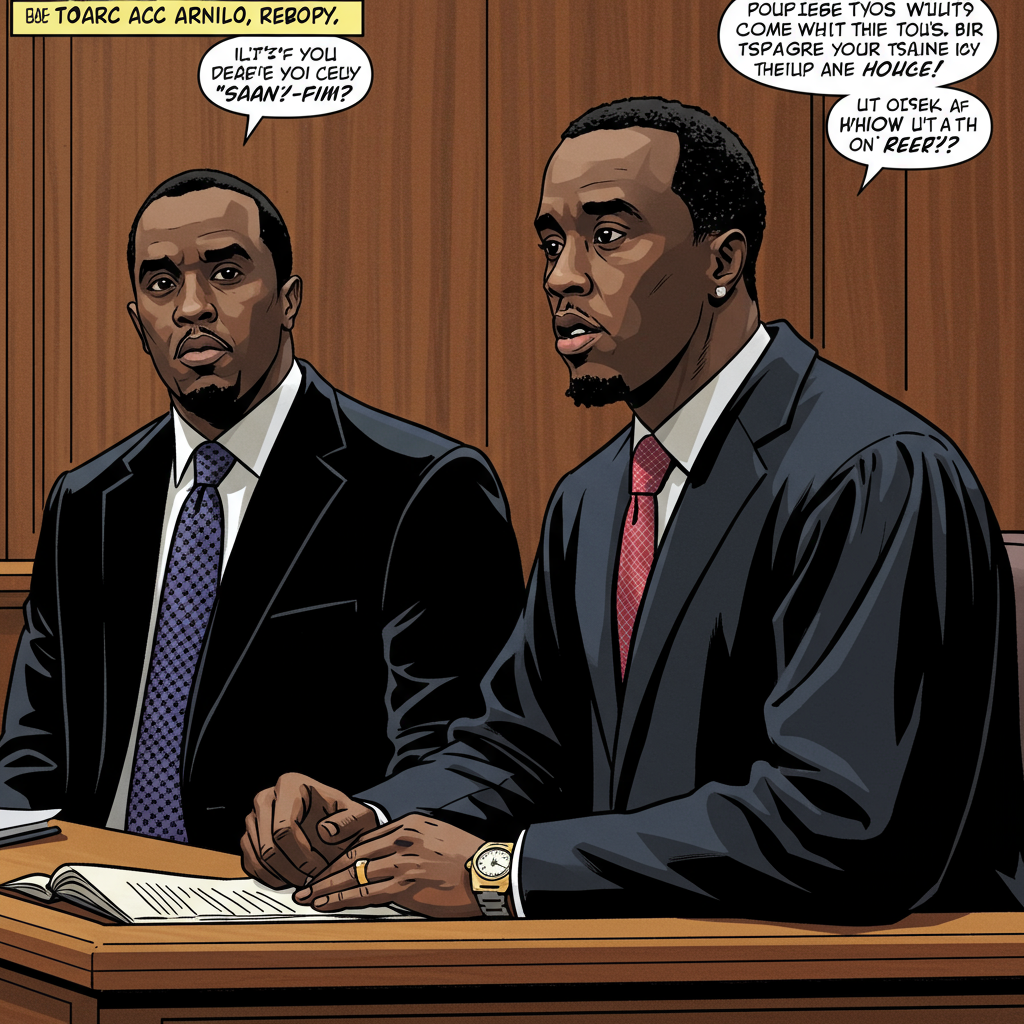A startling comparison by Sean “Diddy” combs’ lead attorney has injected controversy into the final moments of his federal sex-crimes and racketeering trial. Defense lawyer Marc Agnifilo likened the music mogul’s alleged sexually explicit gatherings, termed “freak offs,” to nothing more significant than a couple deciding whether to go to the beach or enjoy a drink together. This comparison, made during closing arguments, aimed to portray the disputed activities as consensual relationship dynamics rather than the criminal acts alleged by the government.
The trial involves serious charges against Combs, including sex trafficking, racketeering, and transportation to engage in prostitution. He has maintained a plea of not guilty to all counts. The legal battle centers on accusations that Combs used his powerful position to coerce women into sexual acts.
The Defense Frames a ‘Consensual Lifestyle’
During an extensive closing argument that spanned several hours, Marc Agnifilo presented the defense’s view of the case. He characterized the government’s prosecution as a distorted portrayal of what he termed Combs’ consensual sexual “lifestyle.” According to Agnifilo, the trial wasn’t about trafficking or racketeering. Instead, he argued, it was about love, jealousy, and money, suggesting the government targeted Combs due to his wealth and celebrity status.
Agnifilo repeatedly referred to the government’s case as a “fake trial.” He urged the jury to focus on the “real trial” based solely on the evidence presented. This tactic aimed to undermine the prosecution’s narrative and the credibility of the accusers.
Minimizing Serious Allegations with a Trivial Comparison
The most striking moment came when Agnifilo addressed the allegations surrounding the “freak offs.” He compared arguments Combs and his former girlfriend, Casandra “Cassie” Ventura Fine, allegedly had about participating in these events to a couple’s minor disagreements. Specifically, he mentioned debating a trip to the beach or choosing between drinking strawberry lemonade or regular lemonade. The implication was that, like small squabbles, these were simply differences in preference within a relationship where “your likes become one” over time.
The defense positioned these alleged events as consensual “homemade porn.” Agnifilo described them as part of a “swingers” or threesome lifestyle. He argued that video evidence, rather than showing aggression, depicted intimacy and pleasant evenings. The defense contended that Ventura Fine “wanted to do this,” portraying her as a willing participant.
Agnifilo also suggested Ventura Fine’s testimony was influenced by her need to align with a rape narrative she had told her now-husband. He questioned the timeline of events, implying her continued sexual relationship with Combs after the alleged assault negated her claims. While acknowledging instances of physical altercations (hitting, kicking, dragging) within their relationship, the defense argued these were separate from the charged crimes.
The Prosecution’s Forceful Rebuttal
Prosecutor Maurene Comey delivered a sharp rebuttal, directly confronting the defense’s claims and the “lemonade” comparison. She argued that equating alleged coerced sexual acts involving substances, potential injury, and lack of autonomy to minor relationship disagreements was a gross misrepresentation. Comey highlighted the stark contrast between a preference for lemonade and the alleged reality. She described women awake for days, covered in oil, wearing 8-inch heels, suffering from UTIs, and allegedly being subjected to unprotected sex with strangers.
“What the defense is suggesting is that these women lied to you repeatedly,” Comey stated. She countered this by asserting the women—Ventura Fine, identified as “Jane,” and “Mia”—had “no reason to lie.” Comey pointed out that Ventura Fine had already settled her civil lawsuit for $20 million. She was not seeking further compensation through her testimony, weakening the defense’s “money motive” argument.
Alleging a Criminal Enterprise Built on Coercion
The prosecution painted a picture of Sean Combs as the “head of a criminal enterprise.” They alleged this operation used his music empire for both legitimate business and unlawful activities, including orchestrating sexual encounters. Prosecutor Slavik, also involved in the case, described Combs as a “general” whose staff helped enforce his power and facilitate the alleged “freak offs.”
Comey argued that Combs used his resources, such as money, career opportunities, and housing, as “tools” to keep alleged victims “trapped.” Referencing a June 2024 incident involving “Jane,” where Combs allegedly beat her and kicked down doors, Comey described it as a “clear cut” example of sex trafficking, asserting Jane had “no choice” but to participate in a “freak off” for hours despite her condition. The prosecution emphasized that under trafficking laws, victims do not need to explicitly say “no” for an act to be considered coerced if they are threatened or manipulated. They argued that “one forced ‘freak off’ is all the jury needs” to understand the alleged coercion.
The prosecution also defended the credibility of their witnesses. They described Mia using a pseudonym and appearing terrified on the stand, suggesting she wasn’t seeking fame. They argued Jane’s continued financial ties to Combs (like rent payment) would, conversely, incentivize her to help the defense, not harm him. Comey addressed the complexity of relationships involving abuse, acknowledging that finding meaning or happiness within trauma doesn’t negate the trauma itself but can be a form of healing.
Context of the High-Profile Trial
Sean Combs, 55, was arrested in September following an indictment by the U.S. Attorney’s Office for the Southern District of New York. The indictment has been amended multiple times, reflecting ongoing investigations. The charges include racketeering, sex trafficking, and transportation to engage in prostitution.
The legal proceedings follow a series of civil lawsuits, most notably one filed by Cassie Ventura Fine in November 2023. Her lawsuit, which was settled quickly out of court, included allegations that Combs compelled her into sexual acts with male prostitutes while he observed. The criminal indictment also references allegations that Combs forced or coerced women into having sex with male sex workers and orchestrated elaborate, multi-day sexual parties often involving drugs and commercial sex workers. These events were allegedly “arranged, directed, masturbated during, and often electronically recorded” by Combs.
During Friday’s court proceedings, where the closing arguments took place, Sean Combs and his son Justin Combs faced a newly filed gang-rape lawsuit from a Texas lawyer. This adds another layer of legal challenges surrounding the Combs family.
Navigating Complex Allegations and Defense Tactics
The defense’s strategy throughout the trial has been to portray the alleged activities as consensual sexual exploration within relationships, specifically as part of a “swinging” lifestyle. They have sought to discredit the accusers, suggesting motives of money, fame, or relationship dynamics unrelated to the criminal charges. Agnifilo attempted to portray Jane as motivated by material benefits and Mia as acting in court. The defense rested its case without calling any witnesses, and Combs himself did not testify.
Prosecutors, conversely, have focused on the power imbalance, alleged coercion, and the pattern of behavior they argue constitutes a criminal enterprise. They have presented evidence and testimony intended to demonstrate that these acts were not consensual preferences but forced participation facilitated by control and manipulation. The prosecution successfully argued for witness anonymity for several potential witnesses, citing concerns for their privacy and safety.
With closing arguments concluded, the jury is scheduled to receive instructions from Judge Arun Subramanian before beginning deliberations. The outcome of this high-stakes trial will depend on how the jury interprets the evidence, witness testimony, and the starkly opposing narratives presented by the defense and the prosecution. If convicted on all counts, Combs faces a mandatory minimum of 15 years in prison and potentially a life sentence.
Frequently Asked Questions
What were the main charges against Diddy in this federal trial?
Sean “Diddy” Combs faced significant federal charges in this trial. These included sex trafficking, racketeering, and transportation to engage in prostitution. He was arrested in September following an indictment by the U.S. Attorney’s Office for the Southern District of New York and pleaded not guilty to all charges.
Why did Diddy’s lawyer compare alleged “freak offs” to drinking lemonade?
Defense attorney Marc Agnifilo used the comparison during closing arguments to minimize the severity of the alleged acts. He argued that disagreements over participating in these events were akin to minor relationship preferences, like choosing a beverage or destination. This aimed to frame the alleged “freak offs” as consensual activities within a relationship rather than forced criminal acts.
What happens next after closing arguments in the Sean Combs trial?
After the closing arguments concluded on June 27, the jury is scheduled to return on Monday, June 30. They will receive instructions from Judge Arun Subramanian regarding the law and how to evaluate the evidence presented. Following these instructions, the jury will begin their deliberations to reach a verdict on the charges against Sean Combs.



